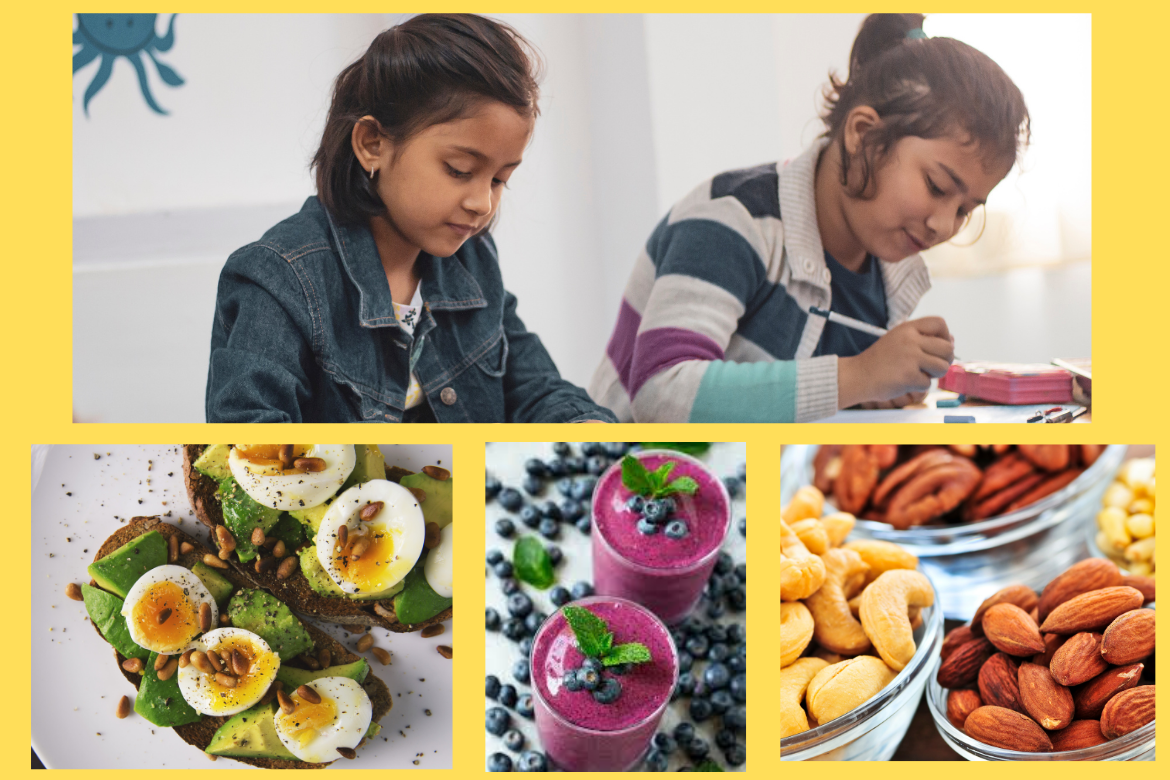BRAIN-FUELING FOR EXAMS

BY FAAIZAH ASMAL LAHER (Clinical Dietician)
Getting the Best Results During your Exams with the Best Nutrition Tips!
Amidst revision sessions, cram sessions and long hours looking over study guides, the idea of eating healthily around exam time can often fall by the wayside. It’s easy to think that, just for now, a slice of pizza and chocolate will be enough to see the exams through. While the stress of exams is real and warranted (to an extent), pairing your study times with good nutrition practices will ensure that everything you put into your mind, stays there with the help of all those impressive nutrients from your diet!!!
Brain and Gut connection you say??
Do you ever wake up on an exam morning, feeling nauseous, with ‘butterflies’ running havoc in your tummy? The first big exam of the year and you have found yourself with a runny tummy? That is because the gut-brain connection is no joke; through this gut-brain connection, we can link anxiety to stomach problems and vice versa. The gastrointestinal tract is sensitive to emotion, anger, anxiety, sadness, elation, and all these feelings can trigger symptoms in the gut.
The brain has a direct effect on the stomach and intestines. For example, the very thought of eating can release the stomach’s juices before food gets there. This connection goes both ways. A troubled intestine can send signals to the brain, just as a troubled brain can send signals to the gut. Therefore, a person’s stomach or intestinal distress can be the cause or the product of anxiety, stress, or depression. This explains why, the brain and gastrointestinal systems are so intimately connected! Now that you understand how closely the gut and brain interact, it becomes easier to understand why you might feel nauseated before giving a presentation, or test/ exam or feel intestinal pain during times of stress.
Giving your gut a good ‘head-start’ to the exams (mind the pun), will ensure that your body and mind, are well connected and that you give your brain the best chance to perform when you need it most!
The type and timing of your food can help support good digestion, memory, improve your concentration and stabilise your mood to help you achieve the best results in your test or exams. Late nights, stress, missed meals and quick food fixes will all play havoc with your ability to concentrate, absorb information and function properly. So, if you’re in the midst of a revision frenzy, follow our top tips for making the most of your mind.
How to prepare well for exams:
Good nutrition in the lead up to exams will boost mental alertness and help you deal better with long hours of study and pre-test stress. Now’s not the time to go all out on chocolates, down energy drinks or snack on biscuits while you work.
TRY THESE 5 THINGS:
- Eat at regular intervals! Your brain thrives on glucose, therefore keep meal timing to every 2 to 2 ½ hour intervals. The longer the time between your meals and snacks, the lower your blood glucose drops, and the worst your meal choices the poorer your concentration!
- For optimal concentration on break days, start your day with a high protein, high fibre breakfast. Then snack (see our snack list) every 2 hours, and combine your snacks with a brain break!
- Its exam day, and you’re feeling a little nervous, don’t skip breakfast! Start your day with a small light breakfast, and then another just before leaving home. So think a small yoghurt (or try whole wheat pronutro/ or futurelife) to bring blood glucose to normal, then a high protein high fibre snack just before you leave. This can even be a smoothie or egg and toast.
- Stop for small snacks to keep up fuel to the brain
Tempted to reach for something sweet to get you through the afternoon? Prepare some tasty snacks to munch while you’re working instead. The temporary high you’ll get from sugar will be quickly followed by a crash in blood sugar levels, which causes fatigue. - Avoid snacks that are loaded with refined sugars and stick to those that are both healthier and can boost your physical or mental health at the same time. It is important that while you are optimising your study time to make sure your brain is not spiralling around on a rollercoaster with high sugar snacks!
2. Eat nutrient-dense foods, not calorie-dense foods!
Food rich in nutrients will give your body and mind all it needs to keep functioning at its best! Foods rich in iron and zinc for improved memory and concentration are important and include one of these at each meal. These are lean red meat, fish and seafood, chicken, nuts and whole grains such as brown rice, grain breads and wholegrain breakfast cereals. Also try including broccoli, salmon, blueberries, pumpkin seeds and nuts into your exam-time diet. They are great for year-round brain health!
3. Fibre, Fibre, Fibre!!!
Yes! Fibre is important for slow release energy. These foods are vegetables, fruit, legumes and Low GI grains. Foods rich in fibre are minimally processed and are rich in nutrients! See our Fibre rich grains list! Include one small portion at each meal. Enough fibre will also prevent constipation, if you prefer not to exercise during your exam period. Very large carbohydrate portions (and also deep fried foods) will make you sleepy and lethargic.
If you do find yourself feeling very sleepy and unable to concentrate, check your sleep habits. Did you get a good nights rest last night?
4. Omegas 3’s for brain health!
Omega 3 fatty acids are essential for brain function and development. Rich foods include canned tuna, canned salmon, prawns and calamari. Alternatively look for the omega-3 enriched spreads, breads and eggs now on the market.
Omega 3 fatty acids ensure good brain health.
5. Hydration!
Keeping well hydrated will ensure you stay healthy during these hot months and ensure you stay hydrated and prevent fatigue. Healthy kids should drink between 5- 6 glasses of water a day, and adolescents and teens will need more.
Ideally most of this should come from water, but clear soup, tea, low-fat milk and juices also contribute. Lots of caffeine rich drinks, promote water LOSS, but while they do keep you awake, they do mess with sleep cycles when consumed after 4pm or too close to bed time!
Pre-exam meal ideas
Aim for a light meal or snack that provides carbohydrate for glucose to fuel the brain, combined with protein and a little of the ‘healthy’ fats. Make sure it is familiar food – don’t eat anything unusual or that you have never tried before on the day of your big test.
For morning exams:
NEVER skip breakfast!! – many studies show that concentration, performance and memory are higher if you eat in the morning.
Easy Overnight Oats and a boiled egg
Whole grain toast, scrmabed egg and Salmon ribbons
Whole grain Toast, Peanut butter, chia seeds and banana slices
Spinach Omelett with cottage cheese and toast
For afternoon exams:
Have a light lunch that won’t have you nodding off with post-meal sleepiness.
A bowl of soup and bread roll
A Tuna sandwich with a small side salad
A chicken and salad wrap
Chicken and couscous salad with rosa tomatoes
Hummous, Yoghurt and falafel with whole grain Pita
Scrambled eggs, spinach on toast
Can’t handle solid food?
Go for a liquid meal – blend your own smoothie or blend your oats to drink.
Snacks that re easy to grab, pack and take along to a study session:
– APPLES AND PEARS
-CARROT AND CELERY STICKS
-SWEET PEPPER SLICES
-CARROT SLICES OR STICKS
-ROASTED CHICKPEAS
-BROCCOLI AND CAULIFLOWER FLORETS
– POPCORN (PORTION CONTROL!)
– OAT OR WHOLE WHEAT CRACKERS
– NUTS AND SEEDS
Slightly more substantial snacks, that will keep blood sugar levels, and also keep you full:
– WHOLE WHEAT TOAST WITH NUT BUTTER
– CHERRY TOMATOES WITH HUMMUS
– APPLE AND MOZZARELLA CHEESE
– PLAIN LOW FAT OR FAT FREE YOGHURT
– FRUIT AND VEGETABLE SMOOTHIE
– OAT CRACKER WITH CANNED TUNA OR SALMON
– A FRUIT WITH 30G NUTS
– RED SWEET PEPPER SLICES WITH GUACAMOLE
– APPLE SLICES AND NUT BUTTER
Snacks to satisfy a sweet tooth:
– A SLICE OF HOMEMADE BANANA BREAD
– BAKED APPLE WITH CINNAMON
– UNSWEETENED DRIED FRUIT
– FROZEN GRAPES or BLUEBERRIES
– FRESH FRUIT SALAD
BLUEBERRY BREAKFAST SMOOTHIE: (makes one portion)
In a blender add the following:
- ½ cup frozen or fresh blueberries (other berries also work)
- 1 tsp chia seeds
- 1 tsp flax seeds
- ¼ cup oats
- 1 tsp honey
- ¾ cup low fat milk
Blend until smooth. Serve chilled.
APPLE CINNAMON OVERNIGHT OATS:
These delicious easy to prepare jars for breakfast are always a winner. Since they are easy to prepare, stay well in the fridge and are ready to go, and eat them just about anywhere! You will need 2 medium sized jars, or containers with lids. Each Jar will stay in the fridge until eaten for 4 days. One jar is one serving.
You will need:
– ½ cup oats
– ½ teaspoon chia seeds
– ½ cup low fat milk
– 1 Tablespoon honey
– 1 cup plain yoghurt
– ½ cup grated apple
1. Slightly warm the milk and honey, just so that the honey dissolves.
2. Pour 1/4 a cup oats into each jar.
3. Sprinkle a little cinnamon and ¼ tsp chia seeds into each jar.
4. Pour in the warmed milk and honey. Mix roughly.
5. Add the grated apple.
6. Top with 1/2 cup yoghurt.
7. You can mix it altogether at this stage or leave it layered. Seal well with plastic wrap or a lid.
8. Store in the fridge until breakfast.
9. Serve warm in winter or cold in summer.
10. Tip: Apples can be switched out for peaches, frozen berries, apricots or slightly under ripe mango. Whey protein can also be added or substituted for vegan protein powder. Low fat milk can be swopped out for any nut milk of your choice.
Are you concerned about your child’s eating?
Book a VIRTUAL CONSULT with ECI’S CLINICAL DIETICIAN today! Make a Booking


